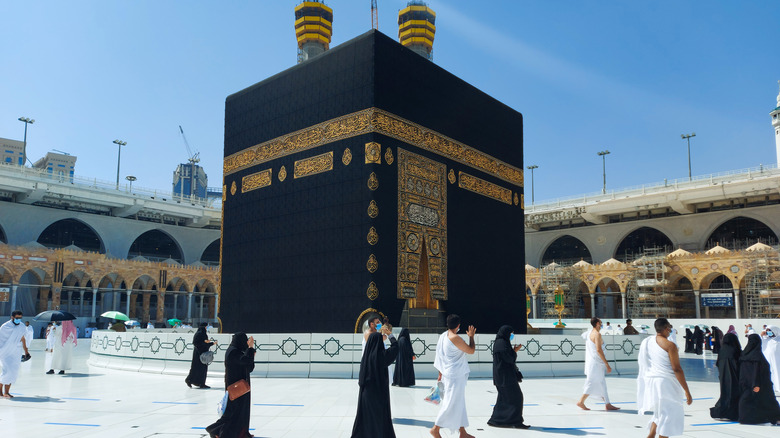Islam's Battle Of Uhud Explained
Islam is one of the major religions in the world, and according to one study conducted in 2017, it will be the most followed belief system by 2075 (via Pew Research Center). Not only that, but it is also the youngest of the other most followed religions, states History. But don't let its youthfulness confuse you for lacking deep history, theology, and other delicate subjects — Islam tells a rich story not only for adherents but also for the world as a whole.
From its inception since the life of the Prophet Muhammad, Islam began affecting the economic and political scene in the Middle East (known as Arabia at the time) for people all over the region. Not only that, but the rise of religion created conflicts in Europe, Asia Minor, and other faraway lands. History reminds us of what happens when new ideas topple the old, and it's not always pretty. Thus, Islam is filled with many tragic stories that include wars, bloodshed, and violence as the religion became an emerging force in the Arabic world — including the Battle of Uhud.
Beginnings of Islam
Before the Battle of Uhud, Islam had already been well-established by Prophet Muhammad and his followers. The prophet was born in A.D. 570 to the Quraish tribe in the city of Mecca, found in modern-day Saudi Arabia (via The Met). At the time, Mecca was dominated by polytheistic religions and was a center of global trade, something Muhammad capitalized on. He found work as a merchant in this town and became quite wealthy from his ventures, but when he was around 40 years old, he started to take a more religious turn.
Islamic texts claim that in A.D. 610, Muhammad meditated in a cave to contemplate strange voices he had been hearing. Upon his exit, he proclaimed that Gabriel — a famous Biblical angel that spoke to other famous religious figures such as Abraham and Mother Mary — had commanded him to speak the word of Allah to all people groups, according to History.
The Battle of Badr
When Muhammad began preaching about his new-found revelations, he was met with some harsh criticism from his colleagues and other people living in Mecca. Most Meccans believed that the financial success of the city was due directly to their worship of pagan gods and found Muhammad's message to be a threat to the very livelihood of the city. However, Muhammad's substantial wealth and family status made him untouchable by the people. Eventually, though, that wasn't the case (via The Met).
Muhammad was forced to leave the city or surrender his life, so he partook in a journey that would eventually become a central part of Islam —the Hijrah (via Britannica). Muhammad and his followers found refuge in the city of Medina, but they were not granted the same civil protections as other groups. As a result, the early Muslims began making money by pillaging traders, including a group of wealthy aristocrats at Badr, starting the first great Islamic battle. The Battle of Badr was fought by 300 of Muhammad's men and 1000 men from the Quraish people, states Britannica. Despite the odds against them, Muhammad's men were victorious.
The Battle of Uhud
Completely outraged by the results of the Battle of Badr, the Quraish people were adamant about getting revenge on the newly emerging religious group, thus setting the stage for the Battle of Uhud. The events at Uhud took place in A.D. 624, about a year after the first Battle of Badr (via Britannica). The new Quraish commander, Abu Sufyan — replacing the previous leader of the same name — had sent 3,000 men and 200 cavalries to fight the Muslims in the Battle of Uhud, according to ZamZam.com. The army even had women travel with them to improve morale as well as carry a religious statue of one of the Quraish gods, states Al-Islam.
The Muslims, on the other hand, had around 750 men and prepared themselves for a Quraish offensive. After hauling stones at the incoming invaders, the Muslims were able to push back the Quraish to a point where the Quraish challenged the Muslims to a series of duals, which the Muslims won overwhelmingly. After a tumultuous battle, Muhammad and his followers held their ground, and it began to look like they would once again win against the Meccan invaders — but the celebration came too soon.
Spoken too soon
Near the end of the battle, as victory came into a clear vision for many of Muhammad's followers, some of the Muslims believed that it was certain they were going to win and loosened their positions on the battleground. Archers began leaving their positions to collect the treasures as the Quraish were retreating, but this proved to be a grave decision (via Learn Religions).
By doing this, the archers were disobeying clear orders, as their position was critical in pushing back the enemy. Thus, when the men's judgment failed them, the Quraish were able to recoup and take back lost ground, eventually overcoming the Muslims and handing them a massive defeat, according to ZamZam.com. Instead of outright killing Muhammad and his followers, the Quraish decided to declare victory and leave, but not before leaving the Muslims in utter disarray. Pride was blamed for this loss, and the battle served as a lesson to obey Allah's word above all else, or else his wishes and prophecies won't come true.
A valuable lesson
After the Battle of Uhud, the Muslims and the Quraish would face each other one last time in the Battle of the Trench/Ditch. Two years after the Battle of Uhud, in the year A.D. 627, the Quraish wanted to pillage the city of Medina, the place where Muhammad and his fellow Muslims were living. Medina was protected from three sides by natural barriers, but it had an opening on its northern front, according to Islamic Information. With the advice of a friend, Muhammad decided to dig a trench there, something that proved vital in defeating the superior Quraish forces (via Britannica).
The Quraish sent 10,000 men into battle, but they were tremendously stalled by Muhammad's defenses. As the Meccans were forced to spread out, the Muslims were able to strike in a strategic battle, even though they only had around 3,000 men (via Islamic Information). The Muslims eventually won, and Muhammad informed his followers that Allah proclaimed that no one would ever win a war against Islam. However, the previous Battle of Uhud reminded Muslims then and now that this statement is conditional, and its truthfulness relies on whether or not they put their faith before their pride.





